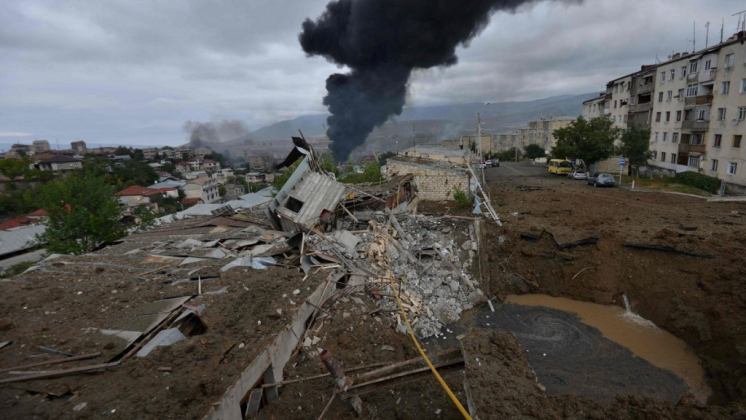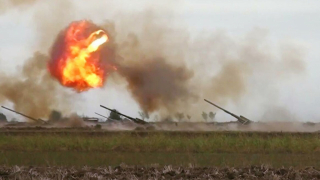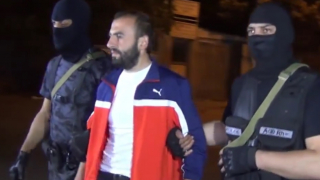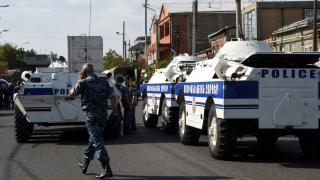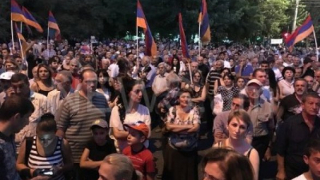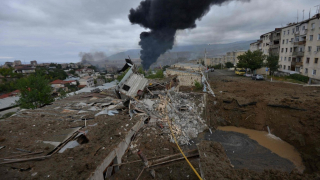Rivalry in Nagorno-Karabakh
After six weeks of hard fighting, the war for Nagorno-Karabakh, known to Armenians as Artsakh, ended with mediation of the Russian Federation. Judging by the points of the final agreement, there can be no doubt in the victory of Baku, which, except for the complete control of Artsakh itself, achieved significant and visible results on the field. All areas lost in the previous war, a sort of a buffer zone around Karabakh itself, are under control of Azerbaijan again, with part of the Armenian enclave itself falling into the hands of Baku.
In contrast to Azerbaijan, the only achievement of Armenia was the preservation of reduced territory of Nagorno-Karabakh, with control over the Lachin corridor being given over to the Russian peacekeeping forces.
According to the data of the official Azerbaijani sources, the number of dead at the end of the conflict was 2,783 soldiers, with another hundred being actively search for, while almost 1,300 were were wounded. During combat 541 Islamists, whose units arrived in Azerbaijan before the war began thanks to Ankara's efforts, perished as well. On the other hand, the number of Armenian soldiers killed in action amounted to 2,996. Available data related to the number of wounded and killed, together with destroyed vehicles and other heavy weapons, starkly depict the brutality of this conflict.
During the conflict, unlike Turkey, which openly helped Azerbaijan and equipped it with modern means of waging war, open Moscow involvement seemed rather limited, to a considerable extent, and, like other countries, was limited to calls for an end to the fighting and a return to negotiations.
Analysts following Turkey's foreign policy moves have seen Ankara's involvement in this conflict as part of a broader pan-Turkish and neo-Ottoman strategy which gained in prominence during second decade of the 21st century. Turkish influence can, as well, be seen in Syria and Libya, in the eastern Mediterranean and in Central Asian republics. What is overlooked, when looking at Ankara's geopolitical efforts, is that Turkey is creating opponents and competitors almost everywhere, precisely by acting in accordance with its neo-Ottoman ideology.
On the other hand, Russia found itself on the opposite side from Turkey in almost every one of these crisis points. There is no need to waste words on Moscow's activities in Syria. In Libya, General Haftar enjoyed Russia's support, while the former Soviet republics in Central Asia are linked to Russia through Eurasian Economic Union and the CSTO. The impression is that, only in the case of Armenia, Russia has not taken the proactive stance that could be observed in Libya or Syria.
There are several different interpretations for this attitude of the Russian Federation. A number of analysts see Russia's behavior as a clear message to Yerevan, which had been signaling its possible westward turn since the colored revolution of 2018 through attempts of increased cooperation with Western geopolitical actors, with special emphasis on the European Union and the United States. Others see Russia as a declining power, and view this episode in Artsakh through perspective of dominant power replacement, where Russia's sphere of influence recedes as as that of Turkey expands. Some authors view Russia's behavior by emphasizing respect for the principles of international law, something Moscow itself invoked during the conflict. Finally, there are those who view the relationship between Turkey and Russia, unrelated strictly to the conflict between Armenia and Azerbaijan, through the prism of changes within the global system of international relations, that is, the instabilities arising as a result of transition from unipolar to multipolar world order.
This view envisages decline in confidence for long-term agreements and alliances as well as in international and supranational institutions, and views oscillations in behavior between states as a natural phenomenon in transition, further explaining the paradoxical relations between Ankara and Moscow, characterized by economic and military cooperation, but geopolitical competition as well.
The current Armenian administration came to power through the 2018 revolution. A number of analysts immediately defined the mass demonstrations that preceded arrival of the new government as a colored revolution. This attitude is not surprising, especially when one considers the numerous similarities with other movements that have emerged, under the influence of foreign actors, in the past three decades throughout the post-Soviet space. Regardless of the nature of the movement, Nikol Pashinyan became the new Minister of Armenia, replacing his rival, Serzh Sargsyan.
Upon taking power, Pashinyan expressed his desire to deepen relations with the European Union, United States and China, while referring to Yerevan's membership in the EAEU and the CSTO to emphasize his commitment to a high level of relations with Moscow. This attitude is in complete contradiction with the earlier statements of the current Prime Minister, who previously stood out in the political life of Armenia by criticizing Yerevan's accession to the Eurasian Union and, in general, criticizing the relationship between Russian Federation and Armenia. Considering the partial turn to the West, it came as no surprise that Economist declared Armenia the country of the year in 2018. Despite Pashiniyan's statements, the nature of changes in Armenia could not go unnoticed in Russia, especially considering the price paid in the Georgian and Ukrainian cases.
It is necessary to point out, for the sake of impartiality, that Pashinyan interpreted all his political moves as a fight against corruption, that is, as preconditions for stronger and faster economic development. One of the key reasons for the critical attitude towards Russia was the sale of Russian weapons to Azerbaijan, which contributed to erosion of the military status quo between Baku and Yerevan, although the recent conflict indicated drones from Turkey and Israel actually played extremely significant, if not crucial, role.
As in cases of Georgia and Ukraine, external influences, primarily driven by geopolitical motives, caused the strengthening of anti-Russian currents and led to the complete collapse of diplomatic and other relations between Tbilisi and Kiev, on one side, and Moscow on the other. The benefits that Russian Federation would achieve through successful integration of these two countries within its regional and security structures would have been of great value, especially in industrial and geopolitical terms.
Given this did not happen, and that both Georgia and Ukraine are currently hostile to Moscow, the spread of the Western ideological base to Armenia must have left an impression on the Russian political elite. Those who supported Russian behavior point out Russian Federation, that is, the CSTO, has an obligation to defend exclusively the territory of Armenia, which neither includes Artsakh nor the territories that served as a defensive belt against the Azerbaijani attack. However, when it comes to the war itself, it is necessary to look at the situation inside Armenia before the first clashes began.
As we pointed out earlier, Pashinian justified his political moves by fighting corruption. As part of this fight, indictments were filed against former Armenian President Robert Kocharyan and then-CSTO Secretary General Yuri Khatchaturov. In addition to arrests in the field of politics, during two years of his mandate, Pashinyan carried out several purges within high military structures that are otherwise considered very sympathetic to Russia, and connected with the Russian military and industrial complex.
Judging by the scarce number of texts dealing with this topic, the results of the Prime Minister's efforts within the country were limited, and met with resistance both within state administration and among the citizens. On the other hand, it should come as no surprise that these actions have been interpreted negatively in Russia. Experience from Ukraine and Georgia has shown that in countries affected by colored revolutions first to be hit is that part of the state, military and administrative apparatus inclined to cooperate, or already cultivating ties, with Moscow. It is currently impossible to talk about the impact of Pashanyan's accusations on the morale and condition of Armenian army units, but if history is valid indicator, sudden and extensive changes in the command structure, especially high-ranking cadres with experience, usually have a negative impact on military operational and combat capacity.
Regardless of rhetoric that preceded the conflict itself, and predictions of foreign analysts, the impression is that Armenians are fully aware of the far more disastrous outcome that could have befallen Artsakh. Accordingly, Russia is recognized as that state which prevented complete collapse of the Armenian government in Nagorno-Karabakh and mass exodus that would inevitably follow. In statement for Radio Free Europe, Arman Grigorian, a professor at Lehigh University in Pennsylvania, pointed out that "you can also hear the views of different segments of the population saying that had it not been for Russia, the situation would have been completely doomed for ethnic Armenians in Nagorno-Karabakh…Ultimately, it was the efforts of Russia that stopped the war. Had it not been for Russia's efforts it's fair to say that the outcome of the war probably would have been worse for Armenians."
In addition to differing opinions regarding the war in Artsakh, analysts, at least most of them, agree Russia emerged as one of the winners of this conflict, especially when one understands that Moscow has achieved its strategic goals. In accordance with the ceasefire agreement signed by Russia, Armenia and Azerbaijan, 2.000 Russian peacekeepers will ensure compliance with the achieved treaty over the next five years, thus being key to providing a sense of security to the Armenian population within Nagorno-Karabakh, and will take lead in the operations center from which the implementation of the agreement will be monitored.
At the same time, Russian peacekeepers will secure both key corridors, the one connecting Armenia with Artsakh and Azerbaijan with its extraterritorial enclave of Nakhchivan. The issue of this southern pass is of particular importance. Baku and Ankara have high hopes for development of economic projects through this corridor, which is of strategic importance to both countries. The fact that the presence of Russian troops will ensure the implementation of these economic projects speaks volumes about the degree of Russian influence. Given that corridor in question passes through de facto and de jure territory of Armenia, Russia needs only return control over to Yerevan to completely jeopardize all economic plans of both Ankara and Baku.
Current situation on the ground, especially considering the nature of aforementioned land corridors, exists only thanks to the presence of Russian troops, so it is logical to assume that their future maintenance will depend on these same troops. Given that mutual trust between Baku and Yerevan is extremely low, we can conclude that both sides place more trust in Russian peacekeepers than in each other. As stated in the agreement, the mandate of Russian troops is limited to five years, but in absence of objections from the signatories, the mission of the Russian peacekeeping force is automatically extended for an additional five years.
The fact that ceasefire agreement was signed between representatives of Russia, Armenia and Azerbaijan clearly indicates the successful limitation, by Moscow, of both the influence of Turkey and the influence of other powers, with special emphasis on those from the Minsk Group, that is, United States and France. Moreover, the text of the agreement itself does not mention any of the countries in question and only mentions the presence of Russian peacekeeping forces. Immediately after signing of the agreement, the Minister of Foreign Affairs of the Russian Federation, Sergei Lavrov, clearly noted that Turkish troops will not be present within Nagorno-Karabakh excluding those Turkish personnel who will perform their duties within the joint Russian-Turkish center for agreement monitoring.
In addition to the fact that Ankara's initial plans were significantly thwarted by Moscow's moves, it is necessary to notice the difference in behavior between Russia and Turkey. Although Turks apparently provided decisive support to Azeri, the peace agreement signed between Russia, Yerevan and Baku gave primacy to Russian troops and, through their strategic deployment, enabled Moscow's control over extremely important land corridors for both Armenia and Azerbaijan. Erdogan's plans to settle terrorists loyal to Turkey in the Caucasus, and even within Nagorno-Karabakh, seems to have failed as well. In early December 2020, nine hundred mercenaries returned to Syria after Azerbaijan rejected possibility of their permanent settlement.
According to media reports from the Middle East, approximately three thousand Syrian mercenaries were originally transferred by Turkey to the Caucasus. Three hundred were killed during fighting, while about 900 returned in early December. It is quite logical to conclude that Moscow will not tolerate presence of the same elements it is fighting against in Syria, and that Azerbaijan itself is not interested in growing Turkey's military presence on its own territory, which leads to conclusion that mercenaries will leave the Caucasus sooner or later. Without its troops on the ground and deprived of loyal paramilitary forces, Turkey is limited to ability to project its economic capabilities.
Ten days after ceasefire agreement between Armenia and Azerbaijan was signed, without much fanfare or media attention, withdrawal of Turkish troops from their largest base in northwestern Syria began, which will be handed over to the Syrian army after more than two years. In itself, this event does not have to be related to the events in the Caucasus at all, but it is undoubtedly interesting from the perspective of the Russian-Turkish rivalry both in Syria and globally.
The importance that Russia, as leader of EAEU, attaches to the possible accession of Azerbaijan to this supranational structure should not be neglected either. Moreover, when the number of inhabitants, economic capacity and wealth of natural resources are taken into account, it is clear that Baku would be a more significant addition to the Eurasian Union than Armenia is at the moment. In their earlier statements, representatives of Azerbaijan welcomed the emergence and development of the Eurasian Union, but never expressed a desire to join, with the Nagorno-Karabakh issue being highlighted as one of the key reasons. According to some a, Azerbaijan's entry into the EAEU would have more negative consequences for the country than positive ones. A number of analysts believe that Baku can join the Eurasian Economic Union only together with Turkey, due to the nature of its economy, but the fact remains that Moscow would welcome Azerbaijan's accession to the EAEU, especially given the development of situation after the recent conflict and the fact, demonstrated in European integration, that ascension to different supranational blocs is not exclusively a matter of economics.
On the other hand, after the conflict, Armenia found itself even deeper in the sphere of Russian influence. Protests against Pashinyan, which hit Yerevan immediately after agreement was signed, displayed, among other things, a high degree of Armenian disappointment with passivity of the West, which, during the war, limited itself to messages of support to Armenians and calls for continued negotiations.
In a statement for Canadian CBC, Armenian director Vardan Hovhannisyan implied West was responsible for Armenian defeat, including Canada, further arguing that no steps were taken to help Armenia nor had enough been done to prevent NATO member Turkey from distorting military balance between Yerevan and Baku, which existed before.
Armenia's concerns are product of previous experience with Azerbaijan behavior, which has for almost three decades conducted a campaign to destroy all traces of historical presence of the Armenian people on its territory. The best example is the previously mentioned extraterritorial enclave of Nakhchivan. Namely, before Azerbaijan became an independent state in the early 1990s, the territory of today's Azerbaijani enclave was extremely rich in ancient monuments of Armenian culture, which irrefutably indicated continuity of the Armenian presence in the area.
After gaining independence, Azeri carried out systematic destruction of almost all symbols of the Armenian presence in several phases. In the period from 1997 to 2006, through an officially sanctioned culturicide, Azerbaijan destroyed 89 medieval churches, 5.840 khachkars (stone blocks decorated with Christian symbols, similar to medieval Serbian stećak tombstones) and more than 22,000 tombstones. It is not out of place here to draw a parallel, in terms of attitude towards cultural monuments of the autochthonous population, between the behavior of Azer in Nakhchivan and Albanians in Kosovo and Metohija.
After the lack of interest from Western capitals, it was clear to Yerevan that only Moscow could prevent a new culturocide in territories recently returned to Azerbaijan, a possibility concerning not only Armenians but also some of the world's leading cultural institutions. Immediately after starting their tour of duty, Russian troops, among other things, placed the Dadivank Monastery, one of the oldest centers of Christianity in Artsakh, under their protection. Degree of Armenian concern over the development of the situation could also be seen through change in political rhetoric.
After the lack of interest of Western countries, it is clear to Yerevan that only Moscow can prevent a new culturocide in the territories that were recently returned to Azerbaijan, and which is feared not only by Armenians but also by the world's leading cultural institutions. Immediately after taking office, Russian troops, among other things, placed the Dadivank Monastery, one of the oldest centers of Christianity in Arcach, under their protection. The degree of Armenian concern over the development of the situation can also be seen through the change in rhetoric in the political sphere.
Namely, before conflict in the Caucasus began, leader of Bright Armenia, one of the opposition parties, Edmon Marukyan pointed out that there was no need for a Russian base in Armenia. However, after conflict ended, Marukyan completely changed his position and is now advocating establishment of another Russian base, in south of Armenia, in order to restore balance of power and sense of security among Armenian population there.
Population centers in the Syunik region, which would eventually host another Russian base, are very close to new positions of the Azerbaijan army, while one of main regional roads, connecting the region with the rest of Armenia, passes through Azerbaijan on several occasions. Considering Azerbaijan military budget, which should amount to 2.3 billion dollars in 2021, concerns of the Armenian authorities and political structures are understandable, especially given the fact that Armenia provided slightly more than 640 million dollars for its military forces in 2020,
Looking at the information currently publicly available, one gets the impression that of all countries involved in the war for Nagorno-Karabakh, Russia has ultimately achieved the best results. From a military-strategic point of view, the Russian presence in the south of Caucasus has been strengthened with additional troops and accompanying equipment, while at the same time Turkey was prevented from deploying its military forces and terrorist paramilitary formations for the sake of hard power projection. This result directly opposes those who advocate the view that Russia is losing influence in Caucasus in favor of Ankara. Truth be told, Turkish influence will certainly remain present, but its form will most likely take the shape of economic projects.
In political sense, Moscow has imposed itself as the supreme arbiter of relations between Yerevan and Baku, and formulation of the ceasefire agreement provides it with a status of a guarantor for key strategic interests of both countries. It is nothing new for Russia to perceive Caucasus as part of its sphere of interest, that is, what is called "near abroad" within the Russian Federation itself, and Russia's moves in that sense are quite understandable. The deployment of Russian peacekeeping units was done extremely quickly and efficiently, so efficiently that it would not be inconceivable to assume that units in question were already ready to carry out their assigned tasks. At the same time, it is not impossible that for political reasons, Moscow waited for turning point in the war that would maximally exert Armenians and satisfy Azerbaijan, after which it was possible to apply real political pressure on both sides. The political result of conflict for Artsakh, which is still largely out of Baku's control, was a deeper entry of both Yerevan and Azerbaijan into the Russian sphere of influence.
Five, possibly ten, years of Russian troops in Nagorno Karabakh may seem like a relatively short period, but if we look at the changes that have befallen the world in the last four years alone, it is not impossible that this time span is sufficient for Russia's political elite and its goals. After the conflict, reputation of the West among Armenian population is rather low. Fiasco that were the American elections could only further shake the confidence of an ordinary Armenian citizen in the Western system of government and its ideological foundation. An attempt to improve this impression came from France, whose parliament overwhelmingly accepted government's proposal to recognize Nagorno-Karabakh as an independent republic earlier this year. Move in question has symbolic value and does not oblige administrative bodies in Paris to take concrete steps, which in itself speaks volumes about the nature of the proposal.
More recently, snap parliamentary elections in Armenia, held due to popular dissatisfaction with the conduct of war and subsequent treaty, saw a somewhat surprising victory for the coalition lead by the current Armenian Prime Minister Nikol Pashinyan. From elections itself it was clear that within Armenia currently there are only two major power blocs, the Civil Contract party led by Pashinyan and Armenia Alliance headed by the former president Robert Kocharyan.
Turnout for the elections, a significant parameter in itself, was barely 50% of the eligible voting population and could indicate a low level of nation’s trust in overall current political actors. Final results only confirmed dominance of two previously mentioned political forces in the country, where Civil Contract received 53.92% of votes while Armenia Alliance gained 21.04%.
However, one thing is clear and no kind of political recomposition could change it. Current situation on the ground has degraded previous Armenian positions to such a degree that Yerevan simply has no other choice but to cooperate even more closely with Moscow, for the sake of Armenians both in Armenia and in Artsakh. If situation is observed from this position it becomes clear that question who leads Armenia becomes less important, simply due to the fact that whoever is in position of power within Yerevan has to acknowledge reality of the situation or risk even worse consequences in future.
This is clear even to western countries interested in expanding their influence in Armenia and is illustratively pointed out by Nick Connolly, Deutsche Welle correspondent from Yerevan who, after elections, pointed out that “In terms of the big picture, in terms of where Armenia goes from now, it's really just a choice of different degrees of closeness to Russia. There is really no other game in town for Armenia. Russia is the international guarantor of Armenia's borders. No Western power is willing to offer those sort of guarantees, so it's a question of total alliance with Russia or some engagement with the West, with Europe still dependent on Russia and its soldiers to protect this country from its much bigger neighbors”.
The issue of Nagorno-Karabakh itself is not over. Moreover, nothing similar is specified in the ceasefire agreement. We can assume that this issue has been left for some later period when it will be possible to reach a lasting solution. Driven by its recent triumph, Azerbaijan would at this point most likely demand the complete return of Artsakh, with which Armenia cannot agree. However, due to the defeat, Yerevan can no longer insist on exchanging territories. A change in fortunes of war and possible Armenian victory in some future conflict could lead to an outcome in which Artsakh officially becomes part of Armenia while Baku is left with territories outside the Armenian enclave, but the current constellation of power is clearly in favor of Azerbaijan.
Regardless of the perspectives of foreign analysts and the plans of the Russian leadership in the long run, the undoubted current reality is that only presence of Russian troops ensures the return of displaced persons and stability between recently warring parties.

